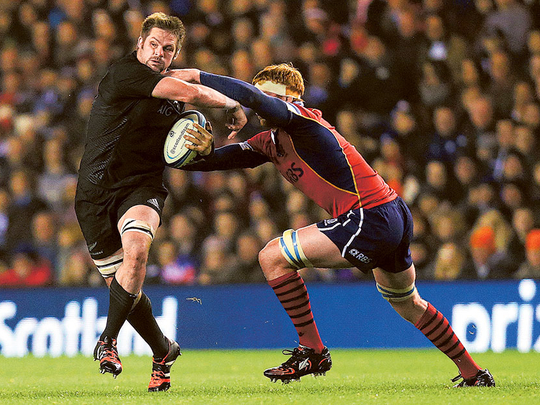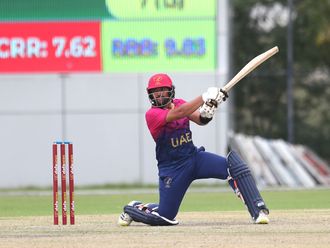
Cardiff
“Not a natural athlete... He had four feet and couldn’t catch a cold.” That was New Zealand coach Steve Hansen’s withering first take on a teenage Richie McCaw when the iconic All Blacks skipper joined Hansen at Canterbury provincial rugby union team.
But the openside flanker, now 33, has gone on to display a desire for self-improvement that will see him win his 137st cap against Wales on Saturday.
The match takes on added importance as McCaw, almost 10 years to the day when he first captained New Zealand - against Wales in 2004, will skipper the All Blacks for a record 100th time.
As an indication of his incredible longevity, notably in a position that demands incredible physical prowess, only 34 other players in the history of rugby union have won 100 caps or more.
Only Ireland’s Brian O’Driscoll (84) and South Africa’s John Smit (83) have come close on the captaining front.
“We’re all very proud. He’s a straight up and down bloke, who’s probably our greatest rugby player ever,” Hansen said of McCaw, who guided the All Blacks to World Cup victory on home soil in 2011.
“It’s nice to be here to share that moment with him, but he’ll be the first to tell you this game’s not about him but about the team playing well enough to walk off the park and be very proud of our performance in getting the win.”
Hansen hailed McCaw, a three-time IRB World Player of the Year, as a driven individual who mastered hard graft at the coalface of modern rugby - the breakdown situation where flankers are the jackals seeking the ball.
“I saw him play in a school game in a tournament in Christchurch, he was about 17,” said Hansen.
“Richie’s not a natural athlete. When he first arrived he had four feet and couldn’t catch a cold. But what he did have was a massive capacity to learn and want to learn and want to be better.
“He was very, very good over the ball. And he had a massive, massive ticker, he wouldn’t mind getting dealt to because he just kept coming back.
“You could run him over with a tractor and he’d still get up and have another go, so there’s courage there.
“But the thing that’s made him the great player he is, outside of his mental strength which is phenonmenal, is his ability to want to get better.
“And even now, with 136 Tests, he wants to get better... that’s phenomenal for an athlete who’s been around as long as he has.”
Hansen added: “You see most players striving to be better in that first couple of seasons as an international, and then they flatline and their performance doesn’t get better and sometimes even dips away.
“He’s evolved his game over time and that’s why he’s probably if not the greatest player, one of them.”
England coach Stuart Lancaster, meanwhile, has warned the 2015 World Cup hosts to expect a fired-up Samoa side playing their “cup final” at Twickenham.
The third of England’s four November internationals, the clash with the Pacific Islanders always looked the most ‘winnable’ of a Twickenham series that has already featured contests against world champions New Zealand and South Africa and culminates with next weekend’s clash against World Cup pool rivals Australia.
But successive defeats by the All Blacks (24-21) and the Springboks (31-28) have turned Saturday’s match into a ‘must-win’ fixture for an England side bidding to end a run of five straight defeats, albeit four have been at the hands of New Zealand.
What will be England’s seventh international against Samoa - the Red Rose brigade have won all six previous encounters - was imperilled when the visitors considered boycotting the match in protest at their treatment by the Samoa Rugby Union.
Although the strike threat has been withdrawn, the underlying tensions that caused the Samoa team to contemplate such drastic action remain.
Not that Lancaster is expecting the controversy to in any way lessen the on-field impact of the traditionally tough-tackling Samoans.







